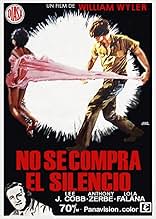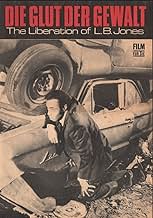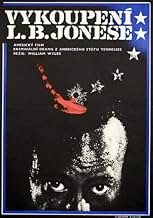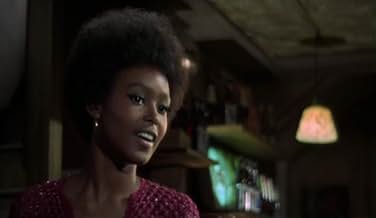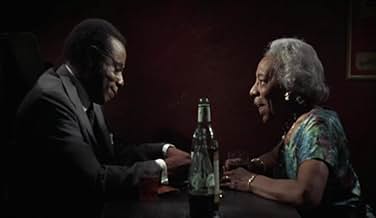VALUTAZIONE IMDb
6,8/10
1284
LA TUA VALUTAZIONE
Aggiungi una trama nella tua linguaA successful African American businessman has a quarrel with a white policeman, suspecting that he is having an affair with his wife. The policeman's colleagues are seeking to avoid publicit... Leggi tuttoA successful African American businessman has a quarrel with a white policeman, suspecting that he is having an affair with his wife. The policeman's colleagues are seeking to avoid publicity.A successful African American businessman has a quarrel with a white policeman, suspecting that he is having an affair with his wife. The policeman's colleagues are seeking to avoid publicity.
- Regia
- Sceneggiatura
- Star
- Premi
- 1 candidatura in totale
Joseph Attles
- Henry
- (as Joe Attles)
Recensioni in evidenza
The Liberation of L. B. Jones (1970) is currently available on Tubi. The storyline involves a black couple going through a divorce when the man discovers his wife is cheating on him with a local white police officer. When the woman hires a lawyer and threatens to fight the divorce, the police officer is informed the nature of their relationship may become public. Since white and black people sleeping together is heavily frowned upon the police officer could lose his job. He quickly goes on a rampage beating his lover and trying to hide the nature of their relationship by any means necessary. This movie is directed by William Wyler (Ben-Hur) and stars Lee J. Cobb (12 Angry Men), Lola Falana (The Klansman), Lee Majors (The Six Million Dollar Man), Roscoe Lee Browne (Logan's Run) and Yaphet Kotto (Alien). The storyline for this is very well told and portrayed. The ex-husband's patience was absolutely unbelievable, but so was his wife's ruthlesness. This movie in some ways gave me divorce PTSD. I loved the character interactions across the board and the set-up by the ruthless and dirty police officers was good, which makes the ending even more enjoyable. Overall this is a smart movie with a well told storyline I would strongly recommend seeing. I'd score this a solid 7.5/10.
William Wyler had such a diverse and non-stereotypical career. He painted on a grand canvas with "Ben-Hur," "Funny Girl," and "The Big Country," romped about with fluff on "Roman Holiday" and "How To Steal A Million," and reined in on tight dramas like "Jezebel," "Detective Story," and "The Collector", all to name but a few. "The Liberation of L.B. Jones" was his last film, and its message is still powerful and taut. Here, Wyler reins in very tightly on a drama, placing his camera stock still in three-walled sets and allows the intensity to grow from the individuals coming undone within its frame.
Hollywood was just turning the corner in its presentation of dramatic material around 1970, with the revolutionary "The Graduate," "Bonnie & Clyde", and "Midnight Cowboy" already released, so Wyler's effort appears rooted to an earlier period in its presentation. Elmer Bernstein's music is bombastic and overly showy. The confining studios sets scream of the backlot environment "daring" pictures were then moving away from. And Wyler's static camera technique is a far cry from the fluid shots used by up 'n coming directors Penn, Nichols, Friedkin, and Wexler. But the overall tone and downbeat ending of "Jones" foreshadowed the de rigueur hard-edged storytelling that would make '70s pictures so vibrant.
Taking place in some jerkwater burg in Tennessee, the title character of L.B. Jones (played with dignified austerity by Roscoe Lee Browne) is a wealthy undertaker whose wife (the smoldering hussy embodied by Lola Falana) is practically rubbing his nose in her affair with a local cop. Jones wants to divorce her. The proceedings, if a courtroom action is necessary, would reveal her liaisons with the policeman, played by Anthony Zerbe, and Zerbe truly does not want his own wife to know of his infidelity. Thus, sets in motion the harrassment and tragedy of L.B.'s situation as only a town full of rednecks can perpetrate towards the threat of an intelligent, self-made African-American man.
Lee J. Cobb as the town's D.A. who always finds a way to help out the white folks, at the expense of blacks, walks a fine line of bigotry and self-discovery. It may be L.B.'s "liberation", but it's Cobb's character that will ultimately be put to a test. What's unique about this film is that he fails, miserably. Most movies made in the '80s and '90s about the racial plight of African-Americans, whether it be "Cry Freedom" or "Amistad" always have that knight in shining "white" armor that studios feel are needed to "help" the black man break the bonds of tyranny. The black character is never allowed to just gain freedom, discovery or triumph on the merits of his own strengths. This film has the guts to show L.B. take his "liberation" into his own hands, albeit with tragic results, and damns the white majority who are a long way from compassion and understanding.
The standout performance in the flick comes from Anthony Zerbe. If all you've seen are his scenery chewing in "Omega Man," his digit-dropping in "Papillon" or his head exploding in "License To Kill," check out his fully-fleshed out character of Willie Joe in this film. He embodies centuries of redneckdom in one person, portraying the self-inflated, unrepentent coward sheltered in police corruption so effectively that he masterfully overshadows the performances of everyone else onscreen. Unfortunately, Yaphet Kotto as a vengeful out of town visitor is given very little to do. And Barbara Hershey and Lee Majors barely have enough motivation to fill in their sketchy roles as Cobb's daughter and her altruistic lawyer husband.
If you can stand a little datedness to the narrative (and Elmer Bernstein's horrible score), take a look at this unflinching glimpse at an era of bigotry we thought was eradicated...but it's obviously not. My rating **1/2 out of ****.
Hollywood was just turning the corner in its presentation of dramatic material around 1970, with the revolutionary "The Graduate," "Bonnie & Clyde", and "Midnight Cowboy" already released, so Wyler's effort appears rooted to an earlier period in its presentation. Elmer Bernstein's music is bombastic and overly showy. The confining studios sets scream of the backlot environment "daring" pictures were then moving away from. And Wyler's static camera technique is a far cry from the fluid shots used by up 'n coming directors Penn, Nichols, Friedkin, and Wexler. But the overall tone and downbeat ending of "Jones" foreshadowed the de rigueur hard-edged storytelling that would make '70s pictures so vibrant.
Taking place in some jerkwater burg in Tennessee, the title character of L.B. Jones (played with dignified austerity by Roscoe Lee Browne) is a wealthy undertaker whose wife (the smoldering hussy embodied by Lola Falana) is practically rubbing his nose in her affair with a local cop. Jones wants to divorce her. The proceedings, if a courtroom action is necessary, would reveal her liaisons with the policeman, played by Anthony Zerbe, and Zerbe truly does not want his own wife to know of his infidelity. Thus, sets in motion the harrassment and tragedy of L.B.'s situation as only a town full of rednecks can perpetrate towards the threat of an intelligent, self-made African-American man.
Lee J. Cobb as the town's D.A. who always finds a way to help out the white folks, at the expense of blacks, walks a fine line of bigotry and self-discovery. It may be L.B.'s "liberation", but it's Cobb's character that will ultimately be put to a test. What's unique about this film is that he fails, miserably. Most movies made in the '80s and '90s about the racial plight of African-Americans, whether it be "Cry Freedom" or "Amistad" always have that knight in shining "white" armor that studios feel are needed to "help" the black man break the bonds of tyranny. The black character is never allowed to just gain freedom, discovery or triumph on the merits of his own strengths. This film has the guts to show L.B. take his "liberation" into his own hands, albeit with tragic results, and damns the white majority who are a long way from compassion and understanding.
The standout performance in the flick comes from Anthony Zerbe. If all you've seen are his scenery chewing in "Omega Man," his digit-dropping in "Papillon" or his head exploding in "License To Kill," check out his fully-fleshed out character of Willie Joe in this film. He embodies centuries of redneckdom in one person, portraying the self-inflated, unrepentent coward sheltered in police corruption so effectively that he masterfully overshadows the performances of everyone else onscreen. Unfortunately, Yaphet Kotto as a vengeful out of town visitor is given very little to do. And Barbara Hershey and Lee Majors barely have enough motivation to fill in their sketchy roles as Cobb's daughter and her altruistic lawyer husband.
If you can stand a little datedness to the narrative (and Elmer Bernstein's horrible score), take a look at this unflinching glimpse at an era of bigotry we thought was eradicated...but it's obviously not. My rating **1/2 out of ****.
This is a sad film about personal weaknesses. The storyline has several weak points too, but on the whole I should think the movie does a great director like William Wyler justice and is still watchable today. There is a certain similarity with the Oscar winning In the Heat of the Night. The screenplay is by the same author, Stirling Silliphant.
The Liberation of L. B. Jones really belongs to the African American cast, the whites' performances do pale in comparison. Roscoe Lee Browne plays the well-to-do undertaker who is cheated by his wife with a white policeman. He gives his character a quiet dignity that lasts throughout the story, up to the bitter and sad end. Yaphet Kotto's portrayal of an angry young man who comes to town with a score to settle is equally intense and convincing. Both Browne and Kotto have a few very good scenes in which they act by themselves. They both seize the chance to give their characters real depth. Lola Falana is convincing as the amoral undertaker's wife and there is a good supporting cast. I fondly remember a small, well acted scene at the beginning with an elderly lady who regularly visits the undertaker's show room to have a look at the coffin for which she pays instalments.
The white population is, it seems to me, much more stereotypical. The only really interesting figure here is the town's most important lawyer, played somewhat stiffly by Lee J. Cobb. He is a racist against his better judgment. His unlawful actions to protect white criminals seem like a reflex, not coming from the brain but rather from the spinal cord.
The Liberation of L. B. Jones really belongs to the African American cast, the whites' performances do pale in comparison. Roscoe Lee Browne plays the well-to-do undertaker who is cheated by his wife with a white policeman. He gives his character a quiet dignity that lasts throughout the story, up to the bitter and sad end. Yaphet Kotto's portrayal of an angry young man who comes to town with a score to settle is equally intense and convincing. Both Browne and Kotto have a few very good scenes in which they act by themselves. They both seize the chance to give their characters real depth. Lola Falana is convincing as the amoral undertaker's wife and there is a good supporting cast. I fondly remember a small, well acted scene at the beginning with an elderly lady who regularly visits the undertaker's show room to have a look at the coffin for which she pays instalments.
The white population is, it seems to me, much more stereotypical. The only really interesting figure here is the town's most important lawyer, played somewhat stiffly by Lee J. Cobb. He is a racist against his better judgment. His unlawful actions to protect white criminals seem like a reflex, not coming from the brain but rather from the spinal cord.
The "novel" this is based on was according to the author, almost entirely true, only the names were changed to protect the innocent and the guilty. This underlying truth plays out strongly here. I must stop to say the plot synopsis has nothing to do with the film. This is not a mystery with a "who did it" structure and it is not a courtroom justice or injustice movie. The events play out in sequence and we jump from character to character so that it remains, every bodies story, so to speak. We aren't allowed to distance ourselves from the story by taking the look from the good lawyer or cops perspective after the fact. Yaphet Kotto among many, probably gives the best performance. The photography and the score both seem a bit dated, though each have their strong moments, otherwise this doesn't date at all. The characters motives, good and bad, are clearly laid out and well performed. There are a few moments of technical slop, some optical blow ups of shots in the middle of dialog scenes and a couple of lazy zooms that would not have appeared in a Wyler film a few years before that, but in every other way this shows him still at the top of his game. It's a shame that he stopped making films after this. He himself considered it a strong film and he seems to have more or less expected that it would anger people (white ones that is) when it was released. His usual skill with actors is in evidence and there is some interesting use of sound to help tell the story at crucial moments. Very powerful stuff all around.
It is appropriate that the title character is an undertaker for this final film from William Wyler feels like a mass funeral for all hopes of racial reconciliation in the America of 1970, (not that it's gotten any easier now). The last shot of the two white liberals and the lone black radical sitting on opposite sides of the train as it flees the benighted region of bigotry and violence says it all. You certainly do not expect that these thee will come together once the train passes from Kentucky to Ohio! A powerful, somber image to end a powerful, somber film. Somber but not dull. Sure the proceedings can get lurid at times, even semi trashy. But I prefer this to the heavy handed, messagey treatment Hollywood has often employed when dealing with black/white conflict. (See the ouevre of Stanley Kramer and his students). Indeed, had the screenplay, by Stirling Silliphant (revisiting racial bleakness after "In The Heat Of The Night") and Jesse Hill Ford (the novelist upon whose work the film is based and himself a tragic figure), been better, with a fuller examination of the white liberals' characters and their relationship with the white patrician lawyer, wonderfully played by Lee J Cobb, then this film would have approached greatness, in my opinion. As it is let us give it a B for a solid end to one of Hollywood's most distinguished directorial runs, as well as the performances of Cobb, Anthony Zerbe and Arch Johnson, playing two of the more despicable redneck cops you'll ever see, a young and intense Yaphet Kotto and, above all, Roscoe Lee Browne as defiant, unbending LB Jones. Haven't seen enough of this fine actor's work to say whether it's his best but it has to rank fairly high, one would think.
PS...I regularly excoriate TCM on its programming choices (like devoting an entire day to the work of Arlene Dahl or repeatedly showing "Wait Until Dark" and "Alice In Movieland") but I have to congratulate whoever came up with last month's spotlight on final films from great directors. A total blast. At the very least, (as in "Ambush"), interesting and at best, (as in "Madadayo"), eye opening.
PS...I regularly excoriate TCM on its programming choices (like devoting an entire day to the work of Arlene Dahl or repeatedly showing "Wait Until Dark" and "Alice In Movieland") but I have to congratulate whoever came up with last month's spotlight on final films from great directors. A total blast. At the very least, (as in "Ambush"), interesting and at best, (as in "Madadayo"), eye opening.
Lo sapevi?
- QuizFinal film of director William Wyler.
- Citazioni
Emma Jones: It going be something. I can't let nobody rob my baby and I can't let my baby enter this world without a dime!
- ConnessioniFeatured in Classified X (2007)
I più visti
Accedi per valutare e creare un elenco di titoli salvati per ottenere consigli personalizzati
Dettagli
- Data di uscita
- Paese di origine
- Lingua
- Celebre anche come
- The Liberation of L.B. Jones
- Luoghi delle riprese
- Humboldt, Tennessee, Stati Uniti(location shooting - used for Somerton, Tenn.)
- Azienda produttrice
- Vedi altri crediti dell’azienda su IMDbPro
Botteghino
- Budget
- 3.500.000 USD (previsto)
Contribuisci a questa pagina
Suggerisci una modifica o aggiungi i contenuti mancanti

